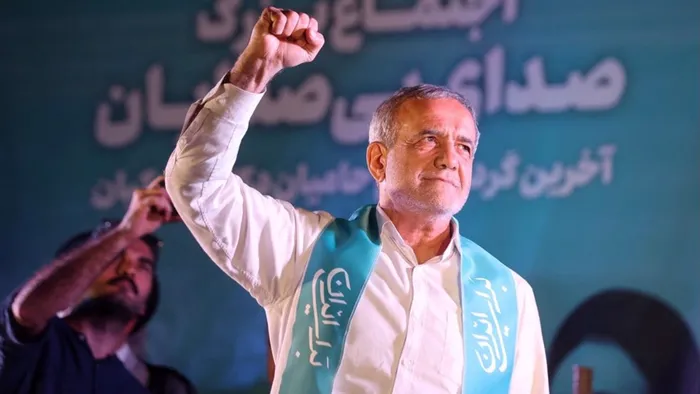President-elect Masoud Pezeshkian promises continuity in Iran’s regional and foreign policies

Iranian President Masoud Pezeshkian. Considered a moderate-reformist, Pezeshkian was declared a winner by the country’s interior ministry on Sunday. Pezeshkian got around 16.4 million votes, almost 54 percent of all votes cast, against Jalili’s 13.5 million votes, around 45 percent, in the runoff elections, which also witnessed an increased participation of voters in comparison to the first round of votes on June 28. Picture: X
By Peoples Dispatch
In a letter to Hezbollah chief Sayyid Hassan Nasrallah, the president-elect of Iran Masoud Pezeshkian declared that support for the Lebanese resistance movement “is deep-rooted in Iran’s core policy” and will continue in the future.
He also expressed hope that Hezbollah and other resistance movements in the region “will not allow the Zionist entity to continue its provocative and criminal policies against the oppressed people of Palestine and others”.
Reformist Pezeshkian was elected to be Iran’s 14th president on Sunday, July 7. The results of runoff elections were declared on Saturday, confirmed by Iran’s Constitutional Council (Guardian Council).
According to the Iranian interior ministry, Pezeshkian got around 16.4 million votes, almost 54 percent of all votes cast, against Jalili’s 13.5 million votes, around 45 percent, in the runoff elections, which also witnessed an increased participation of voters in comparison to the first round of votes on June 28.
Around 50 percent of voters turned out to vote on July 5, in comparison to just around 40 percent in the first round. In the first round of polls, Pezeshkian had emerged as the leading candidate out of the five contestants, with over 42 percent of all votes. Jalili had got around 38 percent votes, eliminating Mohammad Baqer Qalibaf, who got around 14 percent votes.
Qalibaf, a conservative and current speaker of the Iranian parliament, was considered as favourite before the commencement of presidential campaign in June.
The election for a new president became necessary after the death of President Ebrahim Raisi in a helicopter crash in May, along with seven others, including his Foreign Minister Hossein Amir Abdollahian.
The inauguration ceremony for the new president will be held in early August after a formal validation by the Supreme Leader Ayatollah Khamenei, and other processes.
Pezeshkian, in his first public speech following the elections, claimed that it will be difficult to govern “amid the given circumstances” but his government will do everything to deliver on the promises made despite the “bottlenecks, challenges and crises”.
Reformist domestic agenda, continuity in foreign policy
Pezeshkian (70), a surgeon by profession, has been a member of the Iranian parliament since 2006. He has served as deputy speaker of the parliament in the past and as health minister during Mohammad Khatami’s presidency. He contested the presidential elections, promising reforms in policies related to women and better welfare measures.
Pezeshkian, who has been critical of the treatment of protesters following the death of Mahsa Amini in custody last year, had promised greater freedom for women and a better share in the country’s resources for them during the campaign. He promised better management of the economy, enhanced welfare measures, and modernisation of the country’s oil and gas industries.
The Iranian economy has faced difficulties due to unilateral sanctions imposed by the US and its Western allies on the country. Iran has faced high inflation and lack of investments, leading to stagnation for the last several years.
On the matters of foreign policy, Pezeshkian had promised more dialogues with the West to resolve the matters related to the Joint Comprehensive Plan of Action (JCPOA), also known as the Iran nuclear deal, in order to remove the sanctions.
The US, one of the signatories of JCPOA, unilaterally withdrew from the deal and imposed sanctions on the country in May 2018. After dialogue to restore the deal failed, Iran too went back on its JCPOA obligations, related to its nuclear energy programme.
Given the complexity of the decision-making processes in Iran, particularly related to the country’s foreign policy, it will be difficult for Pezeshkian to carry out that agenda without the co-operation of the parliament, which is currently dominated by conservatives.
In the case of foreign policy, the role of the country’s armed forces also becomes crucial, as they are part of the country’s Supreme National Security Council, which decides on foreign policy issues.
Apart from relations with the West, there is a widespread consensus in Iran to continue most other policies adopted by the Raisi administration. This includes rapprochement and better relations with the neighbours, continued support for Syria, Yemen, and regional resistance forces, and working with Russia and China to create a multipolar world system.
This article was first published on Peoples Dispatch
Related Topics: